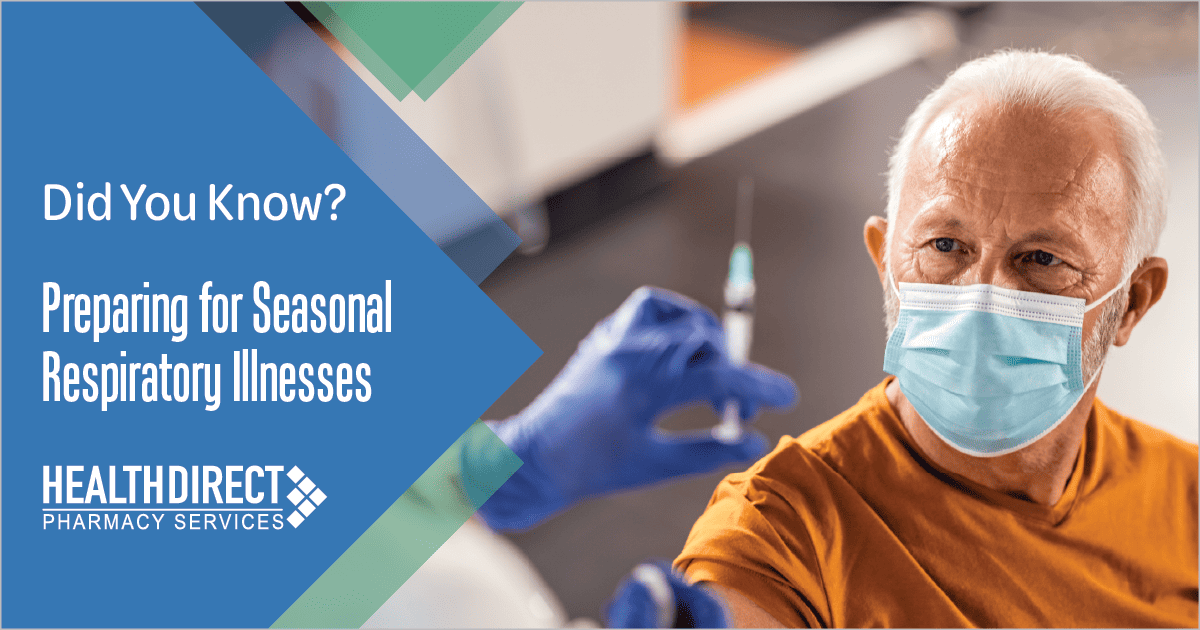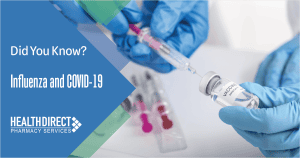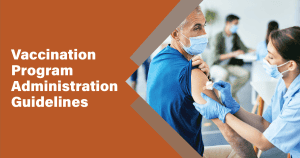Common Fall & Winter Respiratory Illnesses
Circulating respiratory viruses such as COVID-19, influenza (flu) and respiratory syncytial virus (RSV) are
more common in fall and winter, and can lead to significant illness and disease.
COVID-19, flu and RSV are each caused by a different virus. They are considered respiratory viruses, as all three spread primarily by droplets produced when someone who is infected or carrying the virus coughs, sneezes or talks, releasing these droplets into the air. People can become sick if these droplets, infected mucus, or saliva enter their body through the eyes, nose or mouth.
Older adults, young children and people with certain underlying medical conditions are at the highest risk of
getting sick or having severe illness from these viruses. Here is what you need to know to keep you and your family safe during seasonal respiratory illness season.
Prevention Tools for Respiratory Viruses
Vaccines
Vaccines are the safest way to build immunity from a virus. Vaccines help the body learn how to defend itself from disease without the dangers of an infection. The immunity you gain from vaccination can reduce your risk of infection and becoming very sick if you do get infected.
Handwashing & Cleaning
Handwashing with soap removes most germs, including respiratory viruses, from your hands. If soap and water are not available, using a hand sanitizer with at least 60% alcohol can kill these germs. Using household cleaners that contain soap or detergent will remove germs and dirt on surfaces. Daily sanitizing may not be necessary if surfaces and objects are cleaned carefully after use. To sanitize a surface or object, use a weaker bleach solution or an EPA-registered sanitizing spray.
Masks
Their effectiveness against different viruses varies, but in general masks can help reduce the amount of germs you breathe in. You can also use masks to help protect others if you have a respiratory virus.
Air Quality Improvements
Viral particles in the air spread between people more readily indoors than outdoors. Air quality improvement practices, such as opening windows or using air filters, can reduce the amount of virus you are exposed to.
Physical Spacing
The closer you are to a greater number of people, the more likely you are to be exposed to respiratory virus. Generally, infectious droplets and particles are more concentrated closer to the person who is infected. Stay away from others who are sick if possible, and stay home if you are feeling unwell to prevent spreading illness to others.
Immunizations to Protect Against Flu, COVID-19 and RSV
| Vaccine Type | FLU | COVID-19 | RSV |
| Who should receive these vaccines? | Everyone six months and older should get an updated flu vaccine annually. People 65 and older should get a high-dose or adjuvanted flu vaccine, if available. | Everyone six months and older should get an updated vaccine. Some groups may need additional doses to stay up to date. | New RSV vaccines are available for adults aged 60 and older and people who are pregnant. Talk to your health care provider about whether RSV vaccination is right for you. |
| What are the benefits of vaccination? | Flu vaccines reduce the risk of flu symptoms, severe illness, hospitalization, and death. | COVID-19 vaccines are effective at protecting people from serious illness, hospitalization, and death from COVID-19; studies are also demonstrating a reduction in the risk of developing Long-COVID | Vaccination against RSV can help prevent severe RSV-related illness, hospitalization, and death. |
Symptoms of Flu, COVID-19 and RSV
Symptoms of flu and COVID-19 often overlap:
- Change in or loss of taste or smell may occur with both but is more common with COVID-19 infection.
- Fever, chills, cough, sneezing, runny nose, congestion, fatigue, sore throat, shortness of breath, difficulty breathing, muscle pain, body aches, headaches, nausea, vomiting and diarrhea.
RSV usually causes mild cold-like symptoms:
- Cough, sneezing, runny nose, congestion, chills, fever and loss of appetite.
- RSV infection can lead to significant lower
respiratory tract disease, such as bronchiolitis
(inflammation of the lung’s small airways) and
pneumonia.
Testing for Respiratory Illnesses
If you have symptoms of a respiratory virus, testing can help determine which virus you may have and inform your treatment and general management. Because symptoms overlap, clinical laboratory testing may be required to differentiate flu, COVID-19 and RSV infection. Rapid antigen testing is useful in detecting these viruses, but in general is considered less accurate than laboratory techniques. COVID-19 tests are also available to the public over the counter and from community testing sites. It is possible while these viruses are co-circulating to be infected with multiple viruses at the same time.
Treatment Options
If you are experiencing symptoms of respiratory illness, contact your doctor or care team to determine testing and treatment options. Prescription antiviral medications for COVID-19 and for flu are available and can lower your risk of developing severe illness, hospitalization, and death if they are started soon after you become infected.
Treatment for RSV is supportive care, as there are no approved antiviral treatment options for RSV at this time.
Symptom Management
- Manage fever and pain with over-the-counter fever reducers and pain relievers, such as acetaminophen or ibuprofen. (Never give aspirin to children due to the risk of Reye’s syndrome.)
- Rest and Hydrate. It is important for people with mild illness to rest and drink enough fluids to prevent dehydration (loss of body fluids).
- Remedies are also available via prescription and over-the counter to manage congestion, sore throat and cough. Consult your doctor or pharmacist to determine which treatment options are suitable and safe to take with your other medications.
When to Seek Medical Care
- You have a fever that is 101 degrees Fahrenheit or higher that persists for more than two days
- You cough up bloody, brown, or green mucus
- You experience shortness of breath or severe chest pains
- You experience a cough that lasts longer than 10 days to 2 weeks
- You experience persistent pain or pressure in the chest or abdomen
- Development of persistent dizziness, confusion, or inability to arouse
- Severe muscle pain, severe weakness or unsteadiness
- Symptomatic worsening of chronic medical conditions
References:
- CDC. Protect yourself from COVID-19, Flu, and RSV. Available from: https://www.cdc.gov/respiratory-viruses/index.html
- CDC. Immunizations to Protect Against Flu, COVID-19 and RSV. Available from: www.cdc.gov
- NIH. COVID-19 treatment guidelines. Available from: https://www.covid19treatmentguidelines.nih.gov/
- CDC. Influenza Antiviral Medications: Summary for Clinicians. Available from: https://www.cdc.gov/flu/professionals/antivirals/summary-clinicians.htm#




